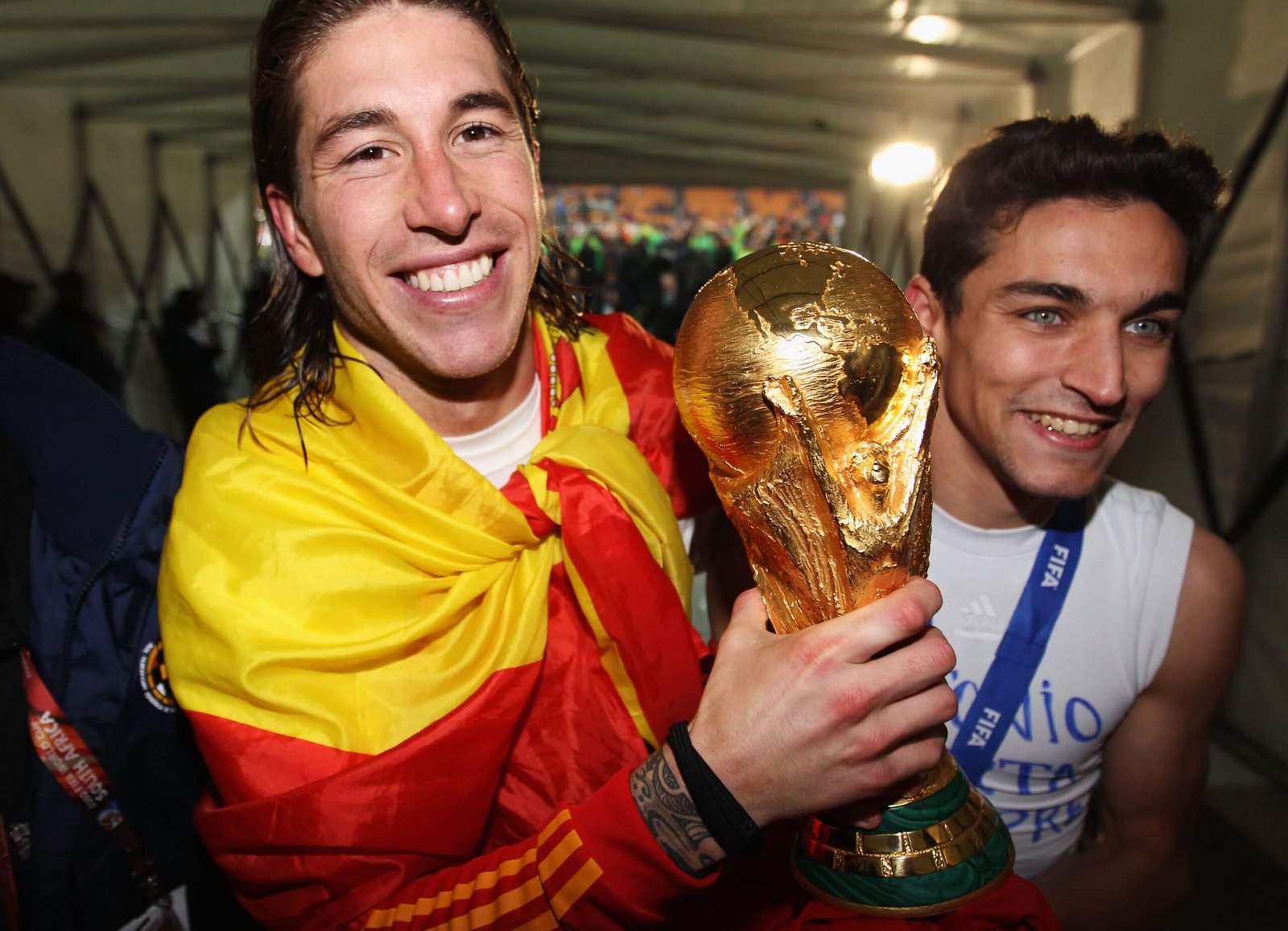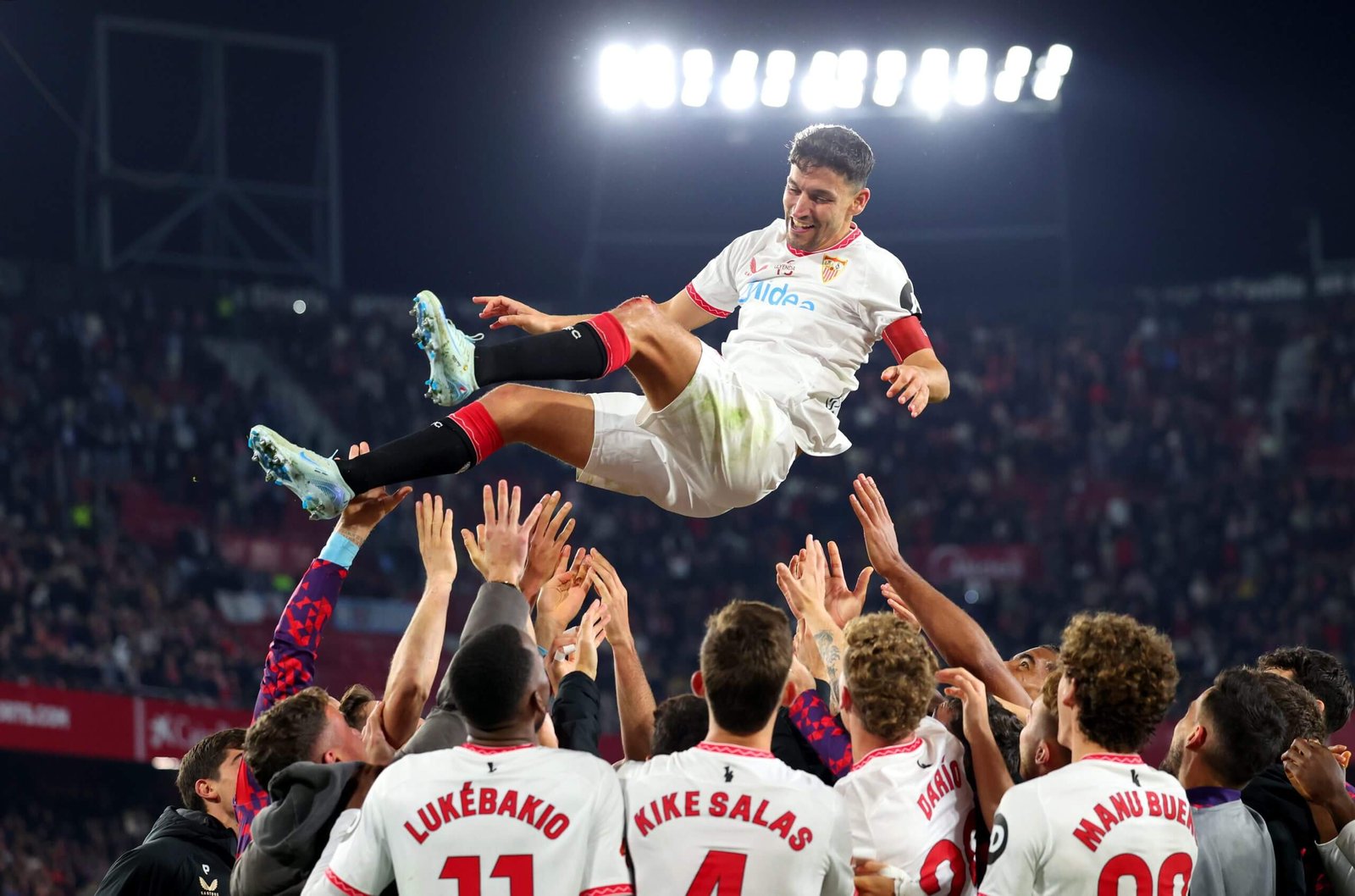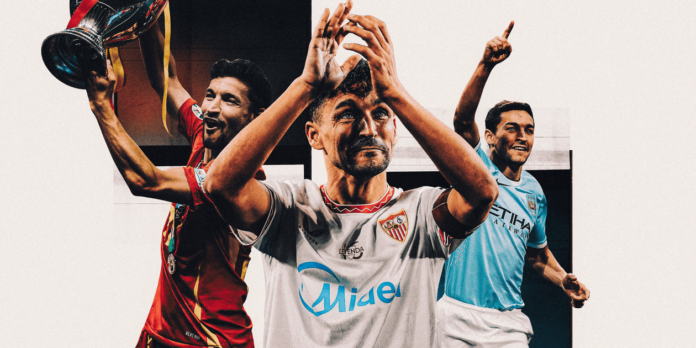One of the most glorious yet understated playing careers in Spanish football history will come to an end this weekend.
Jesus Navas is set to make his 943rd and final senior appearance on Sunday afternoon, as Sevilla travel to the Santiago Bernabeu to face Real Madrid in La Liga.
In nearly 22 years as a senior player, Navas has won eight trophies for Sevilla (including four UEFA Cups/Europa Leagues), three trophies with Manchester City (including the 2013-14 Premier League title), and four senior international trophies with Spain (including the 2010 World Cup and Euro 2024).
Over the years, the darting winger who emerged from Sevilla’s youth system evolved into a reliable and experienced full-back who has prolonged his career as far as possible while dealing with a painful and chronic hip injury in recent seasons.
“I’ve been trying to enjoy the time left with the fans, which is the nicest thing,” Navas, who turned 39 in November, tells The Athletic at Sevilla’s training ground.
“The pain comes when I train hard or play an intense game. That’s when it’s tough to even play with my kids (in the following days). So I try to rest.”
Games don’t come much tougher or more intense than this Sunday away at Real Madrid, the reigning European champions.
“In the end, this is my Sevilla, this is what I love,” he says. “I’ve been helping as much as I can.”
Born just outside the Andalusian capital in Los Palacios y Villafranca, Navas joined Sevilla’s youth academy at the age of 15. After making his first-team debut three years later, he quickly became a starter as Sevilla began to assemble arguably their greatest team of all time.
Established stars Frederic Kanoute, the now Chelsea manager Enzo Maresca, Luis Fabiano and Julien Escude were joined by local youngsters including Navas, Jose Antonio Reyes and Antonio Puerta as the team won two UEFA Cups, two Copas del Rey, a UEFA European Supercup and Spanish Supercopa between 2006 and 2010.
Navas shoots for Sevilla against Middlesbrough in the 2006 UEFA Cup final (Michael Steele/Getty Images)
A reserved person and careful speaker, Navas’ face lights up when reminded of Puerta’s late winning goal against Schalke in the 2005-06 UEFA Cup semi-final second leg. A little over a year later Puerta collapsed and died during a pre-season game in August 2007.
“It was incredible, that goal opened the doors for everything else we achieved, and I gave the assist,” Navas says. “He was my room-mate. It was an immense joy. (Puerta) is in the memories now of every Sevillista.”
Navas’ profile as a pacy, direct winger with a reliable end product led to a call-up to the Spain national side in 2009. In the following year’s World Cup final, it was his driving run late in extra-time that began the move for the winning goal scored by Andres Iniesta.
“The dream of any kid is winning the World Cup with your national team,” Navas says. “To be on the pitch, play a role in the goal to help the team. When the final whistle went, it was the biggest joy. I watch the video (on his phone) every few days, and I still get goosebumps.”

Ramos and Navas celebrate with the World Cup trophy in 2010 (Alex Livesey – FIFA/FIFA via Getty Images)
Navas also contributed as an impact sub when Spain won Euro 2012 as part of a team including Iniesta, Xavi, Iker Casillas, Sergio Ramos and Xabi Alonso. That golden generation is widely regarded as the best in Spanish football history.
“I feel part of that generation,” he says. “We won everything, but it was not just about the results. We played incredible, beautiful football, having the ball the whole game. So it was lovely.”
Navas’ displays for club and country meant persistent interest from richer clubs across Europe and in summer 2013 he accepted a move to Manchester City for €20million (£16.6m; $21m in today’s currency).
His City career began spectacularly, including a superb chipped goal inside the opening minute in a 6-0 victory over Tottenham. The first year in Manuel Pellegrini’s team ended with a Premier League medal and six goals and 13 assists in all competitions.
#Onthisday in 2013, we ‘roasted’ @SpursOfficial with six goals and a beautiful win! Who remembers!? #mcfc pic.twitter.com/M52NoCj2T4
— Manchester City (@ManCity) November 24, 2016
“The first season I was playing every game, and we won trophies: the Premier League and League Cup,” he says.
It has often been said that the quiet character so connected to his home and family in Andalusia struggled to settle in England but Navas does not accept that idea, as his whole life has always been centred around football, wherever he has been living.
“It was a good experience (in Manchester), both on the pitch and personally,” he says, “183 games in four seasons is a lot. My way of being is to be quiet, close to my family. So my life there was not that different from here. I went home and just focused on football, as always.”
Anxiety was actually a more difficult problem when he started playing for Sevilla’s first team as a teenager, Navas says.
“It’s difficult when you start out,” he says. “I come from a small town, very quiet. Training with the youth team, making the leap to the senior side, is not easy. But, in the end, football is everything for me. I overcame that, and it’s gone well.”

Navas was one of City’s goalscorers in the League Cup final win against Sunderland in 2014 (Jamie McDonald/Getty Images)
Over time, Navas was more often a substitute for City, especially after Pep Guardiola arrived as manager in summer 2016. When he did start games, it was often as a stand-in right-back.
“The truth is I got on very well with Pep,” Navas says. “(Right-backs Pablo) Zabaleta and (Bacary) Sagna were injured and he told me I could play there. Even though it was a new position, it all went well.”
While in Manchester, Navas watched Sevilla lift three more Europa League trophies on TV. Since he returned to the Sanchez Pizjuan when his City contract ended in 2017, he has captained them to two more — assisting goals from right-back in both the 2020 decider against Inter and the 2023 final against Roma.
“That competition has made this club grow immensely and given so much joy to the fans,” Navas says. “So every time we play in it, we go for everything. Despite having such a difficult season in 2023 (in other competitions), we were transformed (in the Europa League). The fans carried us along too. It was incredible, tremendous.”
After some years away, the current Spain manager Luis de la Fuente recalled Navas to the international set-up in 2023. He played both games at right-back while winning that year’s Nations League finals and was an important squad member as Spain won Euro 2024 last summer.
“For me, the biggest thing of all is to defend my country,” Navas says. “To win the Nations League, and then the Euros at my age, the truth is it was astonishing.”
The right-hand side of Spain’s team against France last July had both the oldest and youngest players ever to start a Euros semi-final: Navas at 38 years and 231 days, and Lamine Yamal at 16 years and 362 days.
France’s superstar forward Kylian Mbappe beat Navas to set up the game’s opening goal, and the veteran was soon yellow carded for a desperate attempt to stop Mbappe making it 2-0.
“I felt calm, relaxed,” Navas says when asked about that moment. “I knew I had to just keep going. I wasn’t thinking so much about (Mbappe). I’m always thinking about attacking. When we had the ball, I was opening up the pitch, almost like a winger. And one of our goals came from that.”
Navas is referring to his right-wing cross leading directly to Dani Olmo’s winning goal for Spain. Before that Yamal had equalised with an outstanding shot from 25 yards into the top corner.
“(Lamine) has a gift,” Navas says. “He was born to play football. We wingers have that way of playing: to be brave, to play with joy; Nico (Williams) too. I told Lamine it was really important that each time he got the ball, to try to go past the defender. That’s a tremendous strength for the team.”

(Alex Pantling – UEFA/UEFA via Getty Images)
Navas retired from international football after the tournament and was honoured by the Spanish federation at October’s Nations League game against Serbia — with his parents Francisco and Aurora, wife Alejandra and kids Jesus and Romeo also present.
Muy feliz, me habéis hecho muy feliz. Es un orgullo volver a veros y disfrutar de la selección. Gracias a todos por este reconocimiento@SEFutbol pic.twitter.com/nfWnreRsEy
— Jesús Navas (@JNavas) October 15, 2024
“I’ve not changed as a person, I’m still the same guy I’ve always been,” he says. “Keeping my feet on the ground is what got me this far. Knowing that you have to work hard every day, train to the maximum. That is what got me where I am, to win such important things, with the national team, with Sevilla, with Manchester City.”
Navas’ experience and the example he sets have also been invaluable to Sevilla in recent years, when financial issues and boardroom squabbles have affected a team which instead of fighting for trophies has often been battling in La Liga’s bottom half.
There was an awkward moment last June, when Sevilla announced Navas was leaving, even though he wanted to continue. Another six-month contract was agreed with current president Jose Maria Del Nido Carrasco, with all his wages being paid directly to the club’s charitable foundation.
“The important thing was for us all to be on the same wavelength,” Navas says, not wanting to get into the details. “For me, the biggest thing was to continue with Sevilla, to be here, for a transition with the younger players. And to be able to say goodbye to the fans who I love.”
Coach Franc Garcia Pimienta has been managing Navas’ minutes this term. Regular injections are needed for the hip problem he has carried for the last four years. Unable to join in much of the team’s physical work at training, he often has to just lie down for much of the days following a game.
“I know a bit about how to manage it in training,” he says. “Games are more difficult, the strain. But that’s where I am. It’s difficult, with conflicting emotions. After every game, I try to focus on training again, to be able to play just one more game. As it gets closer to the end, it’s been more and more difficult.”
The pain and stress has been worth it for being able to share moments in recent months with his team-mates and Sevilla’s fans — including his winning goal against Getafe in September, and victory in October’s ‘derbi’ over city rivals Real Betis.
Gracias a mis compañeros que me prometieron que ganaríamos el derbi. Ese es el compromiso de este grupo de jugadores y orgulloso de ver cómo lo dieron todo por llevar al @SevillaFC al lugar que todos los sevillistas queremos. pic.twitter.com/bRjzFRyxj6
— Jesús Navas (@JNavas) October 7, 2024
“The feeling is of joy — and of a reward for all the pain you are feeling, the effort you are making,” he says. “Before the derby, the whole week my team-mates were saying they would win the game for me. The fans were very happy for me, and I was very happy for them. They know I’ve always been disposed to help the team, in spite of all the pain, and all I have to do every day.”
Navas’ final start at the Sanchez Pizjuan came in last weekend’s 1-0 La Liga victory over Celta Vigo, when he received a guard of honour from both teams pre-game and an emotional ovation from the crowd when substituted on 71 minutes.
🖼️ Pueden enmarcarla. pic.twitter.com/UDxYylKYzD
— Sevilla Fútbol Club (@SevillaFC) December 16, 2024

(Fran Santiago/Getty Images)
Sevilla have organised an official farewell event on December 30 for Navas and his family. Del Nido Carrasco has offered him a ‘contract for life’ but no exact role has yet been discussed. One future possibility is to coach the youth sides who play at the training ground stadium which bears his name.
“I really don’t know (what comes next),” he says. “I’ve not yet thought about it, maybe something related to the youth system. I’ve just been enjoying the games I can play. And thanking the fans for their support.”
(Photos: Getty Images/Design: Eamonn Dalton)
Read the full article here


